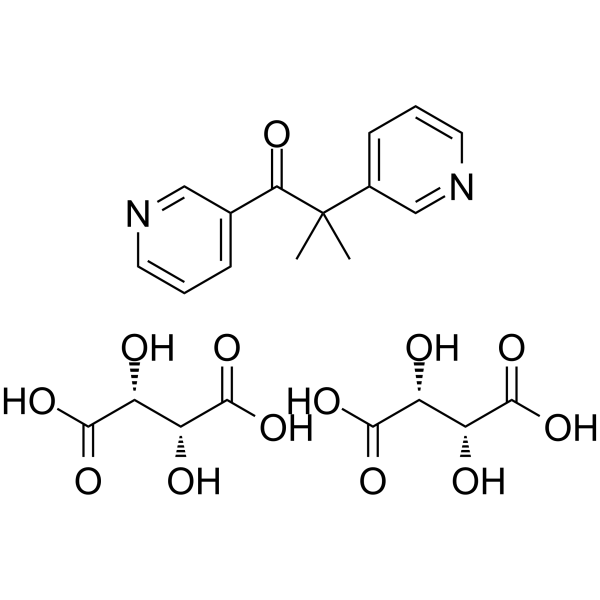| Description |
Metyrapone (Su-4885) Tartrate is a potent and orally active 11β-hydroxylase inhibitor and an autophagy activator, also inhibits the production of aldosterone. Metyrapone Tartrate inhibits synthesis of endogenous adrenal corticosteroid, decreases glucocorticoid levels, and also affects behavior and emotion. In addition, Metyrapone Tartrate increases the efficiency of autophagic process via downregulation of mTOR pathway, and interacts with Pseudomonas putida cytochrome P-450. Metyrapone Tartrate can be used for researching Cushing's syndrome and depression[1][2][3][4][5].
|
| Related Catalog |
|
| Target |
11β-hydroxylase, Aldosterone, CYP450, Autophagy[1][4][5]
|
| In Vitro |
Metyrapone (100 μM; 2 h) hyperactivates autophagy in HepG2, and delays the activation of apoptosis at severe endoplasmic reticulum (ER) stress[5].
|
| In Vivo |
Metyrapone (25 or 50 mg/kg; SC, single dosage) decreases the stress-induced increase in plasma corticosterone levels, significantly impairs acquisition performance at high dosage, and increases open arm activity at low dosage[1]. Animal Model: Male Sprague-Dawley rats (n=179; 270-300g)[1] Dosage: 25 or 50 mg/kg (in a volume of 2.0 ml/kg) Administration: SC, single dosage Result: Dose-dependently decreased the stress-induced increase in plasma corticosterone levels in the water maze test; the high level dose significantly impaired acquisition performance in the water maze and decreased fear-induced immobility; the lower dose increased open arm activity.
|
| References |
[1]. Roozendaal B, et al. Dose-dependent suppression of adrenocortical activity with metyrapone: effects on emotion and memory. Psychoneuroendocrinology. 1996 Nov;21(8):681-93. [2]. Jahn H, et al. Metyrapone as additive treatment in major depression: a double-blind and placebo-controlled trial. Arch Gen Psychiatry. 2004 Dec;61(12):1235-44. [3]. Daniel E, et al. Effectiveness of Metyrapone in Treating Cushing's Syndrome: A Retrospective Multicenter Study in 195 Patients. J Clin Endocrinol Metab. 2015 Nov;100(11):4146-54. [4]. Peterson JA, Ullrich V, Hildebrandt AG. Methyrapone interaction with Pseudomonas putida cytochrome P-405. Arch Biochem Biophys. 1971 Aug;145(2):531-42. [5]. Holczer M, et al. A Comprehensive Systems Biological Study of Autophagy-Apoptosis Crosstalk during Endoplasmic Reticulum Stress. Biomed Res Int. 2015;2015:319589.
|
